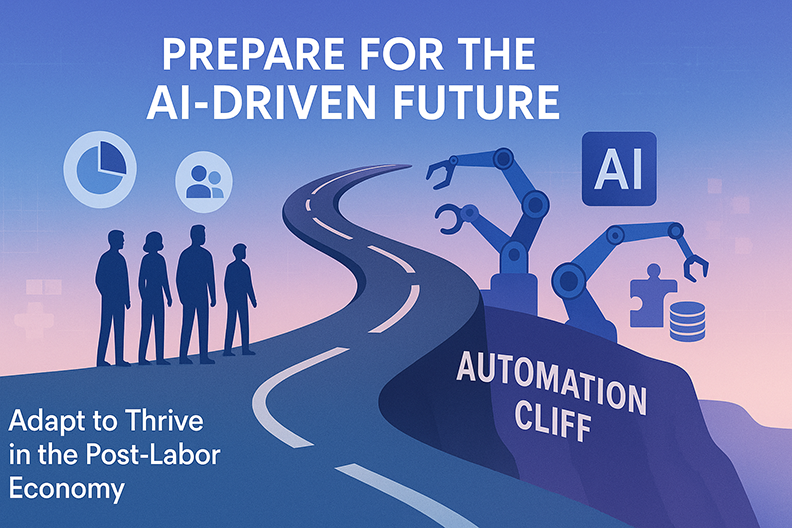The Future of Work: AI's Economic Impact
The future of work is changing fast. Prepare for the AI revolution. Discover actionable strategies for success.

The next three years will revolutionize how you make money, work, and survive. This isn't science fiction; it's reality demanding immediate preparation. Top economists and futurists are sounding alarms, urging you to adapt quickly. Embracing AI isn't optional; it's essential for survival in the rapidly shifting economic landscape.
This blog unpacks the looming crisis, reasons why Universal Basic Income (UBI) is essential but inadequate, and provides five actionable strategies to thrive in a post-labor economy. Let's delve into these transformative changes and how you can position yourself for success.
The Automation Cliff
Economists warn of an "automation cliff," a seismic shift where jobs vanish rapidly, not gradually. Predictions are dire: 60% of administrative tasks, 40% of customer service roles, and 30% of mid-level management positions will disappear within the next 12 to 24 months. This digital revolution is unlike any before, happening much quicker than anticipated. The transition to AI-led operations spells unprecedented changes for global employment.
"AI is better at cognitive tasks, faster at processing, safer, and cheaper than human labor."
Understanding this rapid change is crucial. Historically, technological advancements offered gradual transitions, but AI disrupts this pattern drastically. Businesses must adapt swiftly to harness AI's potential while mitigating job losses. Investing in AI technology or gaining AI-compatible skills becomes imperative.
Why UBI Falls Short
While UBI is a popular solution, it falls short in addressing key issues. Taxation to fund UBI would require companies to face unprecedented rates, incentivizing tax evasion. Furthermore, UBI doesn't address individuals' psychological need for meaningful work, leading to potential social decay.
Moreover, UBI could exacerbate wealth inequality, concentrating wealth with AI owners, while inflation could offset benefits. An updated social contract is needed to address these fundamental shifts. Thus, relying solely on UBI without preparing personally is insufficient.
Invest in AI Platforms
The future belongs to platform stakeholders—those investing in or owning AI and automation platforms. Buying shares in companies like Nvidia, Microsoft, and Google positions you favorably for a future where automation thrives. Look beyond known tech giants to infrastructure providers that empower AI solutions.
"The future belongs to those who own platforms, not just use them."
Explore platforms with user ownership models and consider cryptocurrency projects where users own the protocol, fostering a shared economy against traditional ownership models.
Develop AI-Complementary Skills
Rather than competing against AI, develop skills that complement it—AI prompt engineering, system design, human-AI collaboration, ethics, and oversight. The most valuable employees will seamlessly integrate AI into workflows, enhancing human capabilities rather than replacing them.
Skills emphasizing emotional intelligence and ethical judgment will outshine AI's processing abilities. Your lived human experience becomes a competitive edge in this tech-driven world.
Enhance Community Resilience
As economies transform, robust local communities become vital. Establish or join skill-sharing networks and support community-owned businesses. Building social connections and governance systems enhances resilience.
"Strong community fabric and shared resources outweigh government transfers."
Creating value outside traditional employment structures offers stability in uncertain economic climates. Collective action becomes a crucial survival tool.
Diversify Income Streams
Stop relying on a single income source. Instead, venture into side businesses leveraging AI, monetize hobbies, and invest in income-producing assets. Flux into intellectual property ownership or real estate investments to spread financial risk.
Diversification boosts economic resilience, offering control and security against job market fluctuations.
Pursue Spiritual Alignment
Cultivating spiritual alignment emerges as a core strategy. Define purpose beyond monetary pursuits. Practice gratitude and faith in abundance, fostering a mindset aligned with divine provision. This alignment shifts you from fear-based reactions to purpose-driven initiatives.
"Your spirit perceives opportunities your conscious mind misses."
Embarking on spiritual growth transcends economic challenges, directing focus towards holistic value and meaning.
Conclusion
The looming post-labor economy mandates rapid adaptation. UBI, while necessary, falls short of being a complete solution. Navigating the AI-driven economic landscape requires strategic preparation: investing in platforms, honing AI skills, strengthening community ties, diversifying income, and cultivating spiritual resilience.
Prepare now, as these transformations predict an altered world. Embrace the future, secure a place in a rapidly evolving economy, and thrive with informed strategies. For further AI integration insights, consult First Movers' experts via their coaching services. Stay prepared and prosper in this new era.